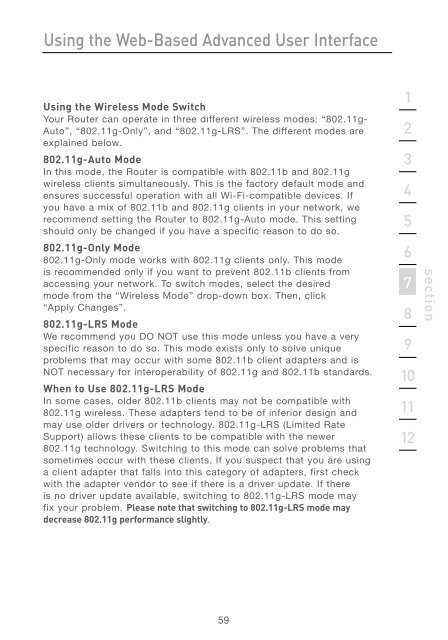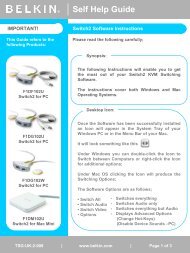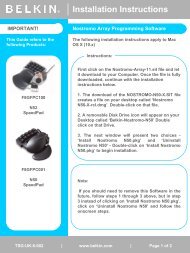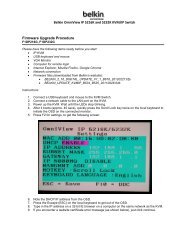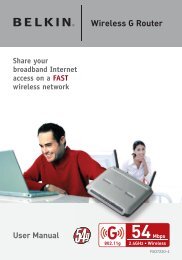User Manual - Belkin
User Manual - Belkin
User Manual - Belkin
You also want an ePaper? Increase the reach of your titles
YUMPU automatically turns print PDFs into web optimized ePapers that Google loves.
Using the Web-Based Advanced <strong>User</strong> Interface<br />
Using the Wireless Mode Switch<br />
Your Router can operate in three different wireless modes: “802.11g-<br />
Auto”, “802.11g-Only”, and “802.11g-LRS”. The different modes are<br />
explained below.<br />
802.11g-Auto Mode<br />
In this mode, the Router is compatible with 802.11b and 802.11g<br />
wireless clients simultaneously. This is the factory default mode and<br />
ensures successful operation with all Wi-Fi-compatible devices. If<br />
you have a mix of 802.11b and 802.11g clients in your network, we<br />
recommend setting the Router to 802.11g-Auto mode. This setting<br />
should only be changed if you have a specific reason to do so.<br />
802.11g-Only Mode<br />
802.11g-Only mode works with 802.11g clients only. This mode<br />
is recommended only if you want to prevent 802.11b clients from<br />
accessing your network. To switch modes, select the desired<br />
mode from the “Wireless Mode” drop-down box. Then, click<br />
“Apply Changes”.<br />
802.11g-LRS Mode<br />
We recommend you DO NOT use this mode unless you have a very<br />
specific reason to do so. This mode exists only to solve unique<br />
problems that may occur with some 802.11b client adapters and is<br />
NOT necessary for interoperability of 802.11g and 802.11b standards.<br />
When to Use 802.11g-LRS Mode<br />
In some cases, older 802.11b clients may not be compatible with<br />
802.11g wireless. These adapters tend to be of inferior design and<br />
may use older drivers or technology. 802.11g-LRS (Limited Rate<br />
Support) allows these clients to be compatible with the newer<br />
802.11g technology. Switching to this mode can solve problems that<br />
sometimes occur with these clients. If you suspect that you are using<br />
a client adapter that falls into this category of adapters, first check<br />
with the adapter vendor to see if there is a driver update. If there<br />
is no driver update available, switching to 802.11g-LRS mode may<br />
fix your problem. Please note that switching to 802.11g-LRS mode may<br />
decrease 802.11g performance slightly.<br />
59<br />
1<br />
2<br />
3<br />
4<br />
5<br />
6<br />
7<br />
8<br />
9<br />
10<br />
11<br />
12<br />
section


